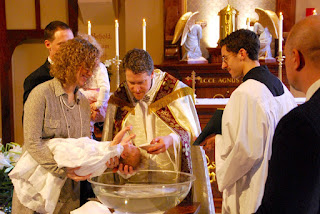This is the video of last week's RCIA session on the last things: death, judgment, Heaven, Purgatory, Hell, the Resurrection of the Body, etc.
Handouts:
Monday, November 23, 2015
Friday, November 20, 2015
The Church
Here's a recent RCIA session that I taught about the Church:
The Handouts I used are:
The Handouts I used are:
- Fullness of Truth Chart
- Christian Denominations Chart
- Call to Conversion Sheet
- New Testament References to the Church
Sunday, May 31, 2015
Why Catholics Don't Wait Until Adulthood To Baptize
Why do some Protestants wait until they are adults to get baptized?
The difference in our practices stems from the difference in our understandings of Baptism. Since the beginning of the Church, we have understood that Baptism actually affects us. It is something that God does to us. Protestants (in one way or another) have rejected the idea that the Sacraments actually do stuff to us. Depending on the denomination, they may be closer or farther from the full truth of what Baptism does, namely:- Allows us to go to Heaven (CCC 1257, John 3:3-7)
- Forgives all sins (CCC 1263)
- Original sin
- Actual sins (obviously none for babies)
- Punishment due to sin (if you died right then, you'd go straight to Heaven--nothing to be purified in Purgatory)
- Gives new life in the Holy Spirit (makes each person a new creature, CCC 1265-1266)
- Adopted by God as a son or daughter
- Given sanctifying grace (made a partaker in God’s life)
- Given Gifts of the Holy Spirit (Wisdom, Knowledge, Understanding, Fortitude, Counsel, Piety, Fear of the Lord)
- Given Theological Virtues (Faith, Hope & Love)
- Given Moral Virtues (prudence, justice, temperance, and fortitude)
- Made co-heir with Christ
- Made into a temple of the Holy Spirit
- Incorporates us into the Body of Christ (the Church)
- Unites us with each other (CCC 1267)
- Also unites us with non-Catholic Christians (CCC 1271)
- Share in Christ’s priestly, prophetic, and royal mission (1268-1270)
- Priestly - we offer sacrifices to God, uniting them to the Sacrifice of the Mass
- Prophetic - we must help spread the faith
- Royal
- We have the dignity of God’s family
- We are at the service of others (servant leadership)
- We belong to the Church
- We respect the Church’s leaders
- We’re allowed to receive the other Sacraments
- Seals our souls with an unremovable mark (CCC 1272)
- We call this an “indelible character”
- Kind of like branding our souls as “belonging to Christ”
- No sin can erase this mark, but we must still be faithful to it in order to spend eternity w/God in Heaven (CCC 1274)
- This mark is given only once, and cannot be changed or given again
- Consecrates us for religious worship (CCC 1273)
Because we recognize how amazing Baptism is, we want that for our children as soon as possible.
Many protestants think Baptism is something they do for God (an outward sign of their acceptance of Jesus). Since they don't understand that Baptism does all the above-mentioned stuff for us, they have no reason to baptize until they're older (when they can make an adult decision to accept Jesus).
They also don't find any explicit mention of baptizing infants in Scripture (though multiple times Scripture mentions whole households being baptized at the same time, Baptism clearly is the New Testament fulfillment of circumcision (which happened to babies), and we have explicit 2nd century texts on infant Baptism as a tradition of the Church). Despite these glaring examples, they hold to a strict sola scriptura mentality and reject the idea that infants can be baptized.
What about "re-baptism"?
Since, to many Christians today, Baptism is something they do for God, there's nothing (in their minds) preventing them from doing it again whenever they have fallen away from God and want to re-commit themselves to Him.
If, after Baptism, I want to re-commit myself to God and show remorse for post-Baptismal sins, I would confess my sins in the Sacrament of Reconciliation, and receive Jesus physically in the Sacrament of Holy Communion. Since protestants lack both of these, it is easy to see why "re-baptism" was invented.
"Re-baptism" fails to understand the unremovable mark on our souls--something that can only be given once, and cannot be changed. That is why the Nicene Creed states "I believe in one Baptism for the forgiveness of sins." I can only receive the mark on my soul once. Any future "baptism" is really just me getting wet.
What about Confirmation?
Confirmation is fundamentally different from the Protestant understanding of Baptism.
It is NOT the public act of the person "confirming" (affirming) that he wants to be Catholic, nor as some say "confirming one's life to Christ."
Confirmation confirms (strengthens) the graces we received in Baptism (something God does to us). In our diocese we confirm as early as possible (age of reason: about 7) because we want our children to have the advantage of those strengthened graces in their souls from as early as possible.
The Sacraments affect us. They are not merely outward actions that we do.
Subscribe to:
Posts (Atom)
